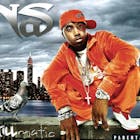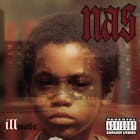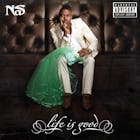
Classic Albums: 'God's Son' by Nas
Classic Albums: 'God's Son' by Nas
By Soren Baker
Published Tue, December 13, 2022 at 12:00 PM EST
Yet again, Nas was at a crossroads.
It was December 2002, and the heralded Queens, New York rapper was dealing with personal and professional strife. His mother passed away in April after a battle with cancer. His feud with the ever-popular JAY-Z was alive and well. On top of all that, a steadily vocal segment of his fanbase wondered if he’d ever reach the artistic heights he displayed with his groundbreaking debut album, 1994’s Illmatic, one of the most universally acclaimed rap albums of all time. For an artist with immense talent, consistent platinum popularity, and seemingly unquestioned status as one of the genre’s elite acts, Nas has a lot riding on the release of his sixth LP.
Rather than attempt to remake Illmatic –something his previous album, 2001’s Stillmatic, gave a nod to and a vocal segment of his fanbase had been calling for since the release of 1996’s wildly popular if less sonically grimy It Was Written LP–Nas continued expanding and exploring the vast breadth of his artistry throughout his 2002 album, God’s Son.
“Who wants to be the same boring person forever?” Nas said to me when I interviewed him in Chicago in December 2002 for the Chicago Tribune. “I’m evolving as a person. I’m changing, growing. Ice Cube cut his jheri curl. Michael Jackson got lighter.”


Like Ice Cube and Michael Jackson in those instances, Nas was reborn in many ways on God’s Son. For instance, he explored his relationship with death in new, intimately personal ways. Sure, the tough gun talk is replete throughout the 14-track project, but he raps about his longing for his mother on “Dance.” The somber guitar- and drum-driven musical bed from Chucky Thompson provides Nas a meditative soundscape to reflect and praise his mother and her role in his life.
“I wish you were here, I miss you more each second I breathe,” Nas raps, “You resting in peace, forever I accepted you free/A blessing to me, I see you dressed in all white/Smilin’ at me, happy knowin’ everything’s all right.”
God’s Son ends with “Heaven,” a haunting track that wonders how people would act and react if they knew that Heaven was only a mile away. Nas questions if drug dealers would continue their ways and if addicts would still seek their high, while acknowledging the pain he endured as his mother was going through chemotherapy during her battle with cancer.
DROP YOUR EMAIL
TO STAY IN THE KNOW
At the end of “Heaven,” Nas details the duality of life, how things may appear to be messed up all around us, but that there’s an abundance of beauty that permeates every one of our lives.
It’s this type of spiritually aware burden that Nas carries throughout God’s Son. He bears the weight of being one of rap’s best, most acclaimed artists while navigating the pitfalls of life, the music industry and rap naysayers.
It’s not surprising given Nas’ reality at the time that “The Cross” is on God’s Son. Here, Nas – who has included religious imagery since his jaw-dropping introduction to the world in 1991 on Main Source’s “Live At The Barbeque” – fancies himself as similar to Jesus Christ, carrying the cross for rap, trudging through rap’s minutia as the self-proclaimed King of the Streets who was then hated, but who has reinvented himself as his followers waited for his return. “The Cross” is rife with Nas’ visceral reactions to novice rappers, deceitful women, familial jealousy, and his mother’s death, among other weighty topics.
While “The Cross” blends the otherworldly with the streets, Nas turns to edutainment on “I Can.” The popular single produced by Salaam “The Chameleon” Remi contains the peculiar sonic combination of portions of Beethoven’s “Fur Elise” and hip-hop sample staple “Impeach The President” by The Honeydrippers. With this elegant yet percussive backing, Nas tells b-boys and girls that they can be anything they want, but to avoid the pitfalls that come with drug use, bad company, and trying to grow up too quickly. On the song’s third and final verse, Nas channels KRS-One with a powerful history lesson, tracing the intellectual and educational might of African empires before they were raided and degraded by Europeans.
Thus, Nas implores to his listeners, “Nobody says you have to be gangstas, hoes/Read more, learn more, change the globe/Ghetto children, do your thing/Hold your head up little man, you’re a king.” For people lamenting rap’s move away from conscious material in the mid-1990s, Nas offered on “I Can” the type of powerful prose that made Public Enemy and Boogie Down Productions among the genre’s most important and popular acts in the late 1980s. More than a decade later, Nas turned the similar trick on a single with “I Can.”
On another God’s Son single, “Made You Look,” Nas demonstrated why many among rap’s cognoscenti view(ed) him as the second coming of Rakim. “The shootin’,” Nas says on the cut’s chorus. “Ah, made you look/You a slave to a page in my rhyme book.” With his words, Nas imagined he’d have listeners reacting to his lyrics in their own lives. That’s power. It’s street hop, the type of lyrical and musical mastery Nas commanded since he stepped on the scene under Large Professor’s tutelage.
Elsewhere on God’s Son, Nas and Remi meld James Brown’s “Funky Drummer” and “The Boss” into “Get Down,” a sprawling lyrical adventure that finds Nas drawing from several real-life escapades to detail some of his wild street dealings in Tennessee and California. “Last Real Nigga Alive” provides his view on the genesis of early 1990s New York rap, how both Raekwon and The Notorious B.I.G. bit him (and how he borrowed from them, too), and the evolution of his JAY-Z beef in this rivalry. Nas fancies himself as Scarface and Jay as Manolo, referencing the brothers as the heart of the classic 1983 film from Brian De Palma starring Al Pacino in the title role.
Early Public Enemy sonics get reworked God’s Son’s the boast-heavy “Zone Out” with the Bravehearts, while “Book Of Rhymes” features Nas purportedly flipping through his old rhyme books and reciting rhymes from them. Nas shares the mic with protégé Lake on the stream-of-consciousness “Revolutionary Warfare,” while the piano- and drum-driven “Warrior Song” features and is produced by Alicia Keys. The latter offers an unusual aural edge via one of R&B’s most popular acts as a forceful Nas details burying his mother and wrestling with the pain of her loss. It all adds up to a brilliant artistic step in Nas’ evolution.
Now 20 years after its release, it’s important to put God’s Son in proper context. It arrived in a dramatically different rap – and musical – reality than we have in 2022. Back in December 2002, music was increasingly being consumed digitally, but the core of the music business remained physical copies, primarily the sale of CDs. Given that reality and the feverish demand with which Nas’ ardent fanbase craved his material, his then-recording home Columbia Records changed the LP’s release date.
“The streets wanted my new album, God’s Son,” Nas said standing underneath an “L” train track on Chicago’s North Side, his breath visible in the frosty December air while recording a take of a commercial hyping the project. “The problem is so did the bootleggers. So I moved the release date to December 13.” He then paused and gave a glassy stare into the camera: “Checkmate.”
Yet again, Nas had the rap game right where he wanted them. Listening to his music.






